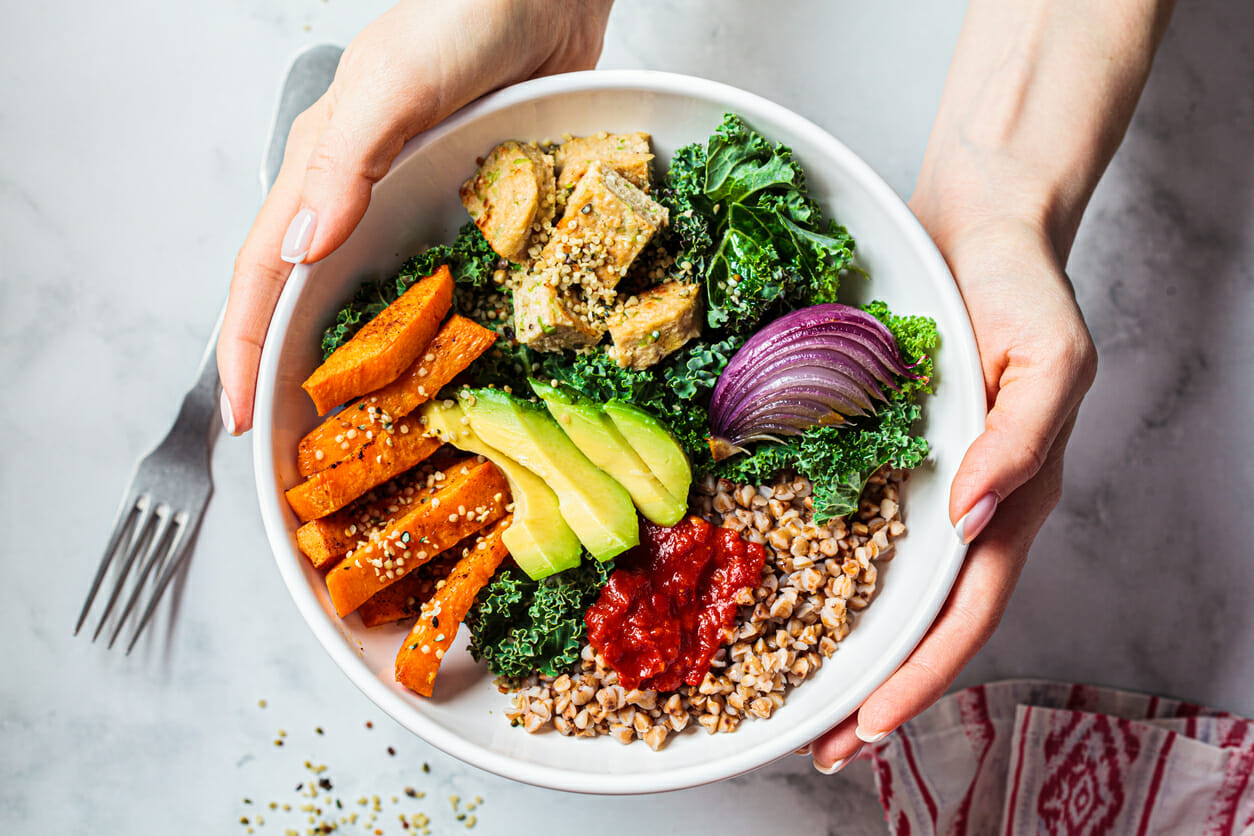Switching to a plant-based diet is becoming a popular choice for many people, whether for health reasons, ethical concerns, or environmental impact. However, for beginners, the transition can feel a bit overwhelming. Where should you begin? What foods should you prioritize? And how can you make sure your diet stays balanced and nutritious? In this guide, we’ll simplify everything for you. From understanding what a plant-based diet entails to tips for creating tasty meals, we’ve got all the information you need to start your plant-based journey. Additionally, we’ll introduce useful tools like a calorie counter to help you track your progress and ensure your meals are well-balanced. Let’s dive in!
MORE NEWS: Tripadvisor reveals the must-visit destinations for 2025
What is a Plant-Based Diet? Explained
A plant-based diet emphasizes eating foods that come mainly from plants. This encompasses fruits, vegetables, whole grains, nuts, seeds, and legumes, while reducing or entirely eliminating animal-based products. The aim is to savor a diverse range of plant-based foods, making sure your body gets the necessary nutrients without including meat or dairy products. A key element in maintaining a balanced plant-based diet is using tools like calorie counters to monitor the nutritional content of the foods you’re eating. These trackers assist in making sure you’re fulfilling your daily requirements for vitamins, minerals, protein, and other vital nutrients.
Top Benefits of Transitioning to a Plant-Based Diet
Embracing a plant-based lifestyle goes beyond simply cutting out meat; it’s about enjoying the many health advantages that come from incorporating more whole plant foods into your diet. From enhancing your energy levels to lowering the risk of chronic illnesses, the benefits are clear. Here’s why you might consider making the change:
Improved Heart Health
Research indicates that adopting a plant-based diet can lead to lower cholesterol levels, better blood pressure, and a decreased risk of heart disease. Rich in antioxidants and fiber, plant foods assist in clearing the arteries and minimizing inflammation, both of which are essential for heart health.
Weight Management
Switching to a plant-based diet can help you manage or lose weight naturally. Plant foods tend to be lower in calories but higher in volume, enabling you to enjoy bigger portions while maintaining a calorie deficit. Plus, the fiber in these foods keeps you feeling full longer, making it easier to avoid overeating.
Improved Digestion
A plant-based diet, rich in fiber, supports digestion by enhancing bowel regularity and fostering gut health. The fiber found in fruits, vegetables, legumes, and whole grains plays a crucial role in maintaining healthy gut bacteria, which are vital for digestion and overall wellness.
Reduced Risk of Chronic Diseases
A plant-based diet is associated with a lower risk of chronic diseases, including type 2 diabetes, obesity, and some types of cancer. The antioxidants and anti-inflammatory properties found in plant foods help safeguard the body against oxidative stress and illness.
Positive Environmental Impact
A plant-based diet offers benefits not only for your health but also for the environment. By cutting back on or completely avoiding animal products, you contribute to lowering greenhouse gas emissions, saving water, and minimizing land degradation. Choosing a plant-based diet is a sustainable option for anyone looking to make a positive impact on the planet.
Easy Tips for Creating Delicious Plant-Based Meals
Switching to a plant-based diet doesn’t mean you have to give up on flavor. With the right ingredients and seasonings, plant-based meals can be delicious and fulfilling. Here are some simple tips for making tasty dishes:
- Get Creative with Plant Proteins: Add variety to your meals by using plant-based proteins such as tofu, tempeh, lentils, beans, and quinoa to keep your diet both interesting and nutritious.
- Spice It Up: One of the best parts of plant-based cooking is the chance to play with a variety of herbs and spices. Consider incorporating turmeric, cumin, coriander, and paprika to enhance the flavor and depth of your dishes.
- Meal Prep for Convenience: Batch cooking is an excellent strategy to save time and ensure you have healthy plant-based meals ready to go. Spend some time on the weekends prepping meals and store them in the fridge or freezer for easy access throughout the week.
- Mix Up Your Grains: Don’t limit yourself to just rice or quinoa. Try out different grains like farro, barley, and bulgur to introduce new textures and variety to your meals.
- Make It Fun: Eating plant-based food can be exciting and flavorful. Get inventive with meals like veggie stir-fries, burrito bowls, veggie burgers, and even plant-based smoothies.
Daily Essentials for a Well-Balanced Plant-Based Diet
Creating a well-balanced plant-based diet means ensuring you receive all the essential nutrients your body requires. Here are the key areas to concentrate on each day: A calorie tracker can be a helpful resource to make sure you’re meeting your targets for these vital nutrients. It allows you to monitor your daily consumption of calories, protein, fat, fiber, vitamins, and minerals, helping you stay on the right path.
- Protein: Be sure to include a variety of plant-based proteins such as legumes, tofu, tempeh, and quinoa.
- Healthy Fats: Add sources of healthy fats like avocados, nuts, seeds, and olive oil to your meals.
- Fiber: Plant foods are naturally high in fiber, which is crucial for good digestion. Make sure to include plenty of fruits, vegetables, whole grains, and legumes in your diet.
- Iron & Calcium: Leafy greens, beans, fortified cereals, and plant-based milks are excellent sources of iron and calcium.
- Vitamin B12: Since this vitamin isn’t naturally present in plant foods, ensure you’re getting enough through supplements or fortified options like plant milks and cereals.
- Omega-3 Fatty Acids: Incorporate flax seeds, chia seeds, and walnuts into your meals to make sure you’re getting sufficient omega-3s.
How a Plant-Based Diet Enhances Your Health
When it comes to health, adopting a plant-based diet can have transformative effects. Here’s how a plant-based lifestyle enhances your overall well-being:
- Improved cardiovascular health: Consuming plant-based foods can help lower cholesterol levels, manage blood pressure, and decrease the risk of heart disease.
- Better digestion and gut health: A diet rich in plants supports a healthy gut microbiome and encourages regular bowel movements.
- Weight loss and management: Plant-based eating can facilitate sustainable weight loss due to its high fiber content and nutrient density, while also keeping calorie intake balanced.
- Stronger immune system: The antioxidants found in plant foods can enhance immune function, reduce inflammation, and help fend off illnesses.
- Improved mental clarity: Many individuals notice increased mental sharpness and focus after adopting a plant-based diet, likely due to better nutrient intake and lower inflammation.
Busting Myths About the Plant-Based Diet
There are plenty of misconceptions surrounding the plant-based diet, and it’s important to separate fact from fiction. Here are some common myths:
Myth: Plant-based diets are too expensive.
- Truth: While some specialty plant-based products can be costly, staples like beans, lentils, rice, and vegetables are quite affordable and often less expensive than meat.
Myth: You won’t get enough protein.
- Truth: There are numerous plant-based sources of protein, such as lentils, tofu, tempeh, beans, and quinoa.
Myth: Plant-based diets are bland.
- Truth: With the right herbs, spices, and ingredients, plant-based meals can be bursting with flavor. Cuisines like Mediterranean, Indian, and Asian provide excellent plant-based options.
Myth: You need to eat meat to build muscle.
- Truth: Many athletes and bodybuilders successfully follow plant-based diets by incorporating a variety of plant proteins to fulfill their protein requirements.
Smart Tips for Adopting a Plant-Based Lifestyle
Transitioning to a plant-based lifestyle might seem overwhelming at first, but with the right mindset, it can be simpler than you imagine. Here are some helpful tips to kickstart your journey:
- Start Slow: You don’t have to make the switch all at once. Begin by adding more plant-based meals to your diet and slowly reducing animal products.
- Plan Your Meals: Meal planning is crucial for making sure you’re eating balanced meals and have all the necessary ingredients available.
- Use Tools Like Calorie AI: Apps like calorie AI help you track your meals and ensure you’re getting all the nutrients you need.
- Join a Community: Connect with others who are on a similar journey. Online plant-based groups can provide support, recipe ideas, and motivation.
- Stay Hydrated: Drinking enough water is vital for any healthy diet, so be sure to get plenty of fluids each day.
Final Thoughts on Embracing a Plant-Based Diet
Choosing a plant-based diet can be a fulfilling decision that brings numerous health advantages, increases your energy, and contributes positively to the environment. Although it might appear daunting initially, it’s essential to recognize that every little effort matters. With the appropriate tools, resources, and encouragement, you can create a balanced and satisfying plant-based lifestyle. Whether your goal is to enhance your health or to explore new culinary experiences, adopting a plant-based diet is an excellent option.




